Think of this as Volume 16, Number 47 of A-Clue.com, the online newsletter I've written since 1997. Enjoy.
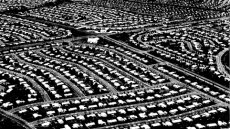
elections missed the key point.
It wasn't about race, and it wasn't
about class. It was about economics, specifically the economic model
most of us grew up in.
That model is the suburb.
The modern American suburb was a
product of the post-war boom. It featured small houses on
postage-stamp lots, where former soldiers and their wives could raise
children in peace with the men working in nearby offices or
factories. (Above, Levittown, New York.)
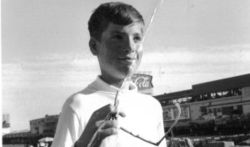
Island. The factories disappeared while I was a kid. And the key
economic fact of our time is that the offices are following them.
What did one do in an office, after
commuting 60-90 minutes on clogged highways to get there? Mostly, it
was stuff you could now do from home. The secretarial jobs are gone,
the middle management ones too. You don't need people to calculate
sales and expenses, and networked PCs allow creative sharing online
that's almost as effective as face-to-face. Salesmen don't need
offices, they need to get out in the field with the customers.
There's just not enough value add in office work to justify the
expense of rent, of commuting and enough in salary to keep up with
the Joneses.
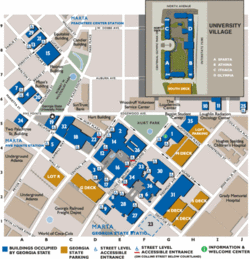
campus. Specifically, it comes from scientific research, and
engineering needed to bring the result into production as new goods
and services. It comes from robotics, from 3D printing, from biotech,
from energy research. Mamas don't let your babies grow up to be
brokers. Raise them to be engineers and scientists, people who can
take the abundance of Moore's Law and turn it into the abundance of
energy the world craves.
This change has been underway for 20
years, since well before Richard Florida dubbed the new work force
the “Creative Class.” He foresaw that the border between living
and working was breaking down. He foresaw the greater urban density
of our time. And he foresaw that tolerance would attract these people
– that breakthroughs could come from any mind, and all minds would
have to be on deck 24-7 to make breakthroughs.
The impact of this on many suburbs has
been profound. More suburbanites now work in the suburbs, either from
home-offices or in nearby office parks, labs, hospitals, and
colleges. Suburbs need to become self-sufficient. The era of the
“ultra-commute” is dying, not just because of its financial cost,
but because it's 3 hours of wasted time each day.
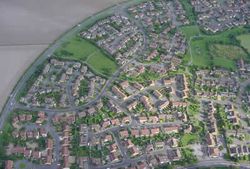
realized in the South, where I live now. The South – the curve of
states from Virginia to Texas sometimes called the “Old
Confederacy,” took to the old suburban model like ducks to water.
Whites loved the idea that they could simply move away from urban
problems, cocooning themselves in new towns further-and-further out,
building wherever the government sent the freeways while claiming to
be self-sufficient. They came to love zoning, the separation of
homes, institutions and shops from one another, the necessity of
having a car. The South is now one big suburb.
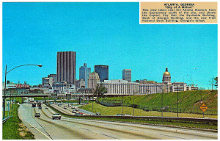
problem is that cities like Atlanta are living like it's 1966, and
it's almost 2013. It's urban universities like Georgia Tech and Emory
that drive the economy now, not the office towers on the I-285
Perimeter. Those buildings have become factories where engineers do
the one thing that must still be done by hand – computer
programming. But even here tools are gradually getting better, and as
computers get faster the programming can get sloppier, programmers
more productive. Business computing is becoming increasingly
automated, in other words, and the center of the business is moving
more-and-more to creative tasks like security and imagining uses for
the increased abundance of the broadband Internet and the cloud.
In a suburb you don't have to see
anyone you don't want to see. You get into your car, you get to your
office, you make the return trip. You associate in church and at
schools only with your own kind. In a city you start to walk, or
bicycle, you may even ride a bus or a train because it's cheaper and
more convenient in short distances, and you see your fellow citizens.
You rub elbows and learn to tolerate the closeness. And when people
are right there next to you, it's harder to dismiss their problems,
to dehumanize them. White voters in Atlanta's inner core are more
like those on today's Long Island than like the people in the suburbs
they left behind.
(I found the picture below on the web, and I'm told on good authority one of the people pictured is my son. I'll let y'all play "Where's Waldo" with that.)
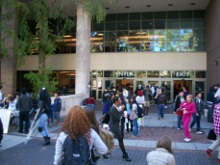
Party faces isn't race. The Confederacy doesn't vote Republican
because they're bigots. They vote that way because they're attached
to old economic models of living, because things are getting harder
out in Snellville and Hiram, because the lifestyle they think of as
immutable is becoming obsolete.
Republicans have to deal with the new
cities, not just the black and brown and Asian and gay and female
people who may be producing tomorrow in them, but the cities. You
can't afford to run away any more, or fewer people can. Density is
going to increase, and society has to adapt to that. It can, by
building small urban cores around suburban towns and college
campuses, but it's going to take time.
Until the Republican Party adjusts to
that economic reality, the re-citifying of America, until they can
offer practical ways to maintain and even improve the common
infrastructure, they'll remain lost and increasingly irrelevant.
That's what Mitt Romney's voters were crying about, the loss of an
old lifestyle. The outer suburbs of the Sun Belt are our new Rust
Belt.










